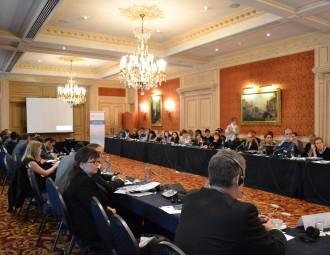EaP CSF First Working Group meeting
 The Working Group discussing upcoming activities
The Working Group discussing upcoming activities
On May 14, 2013 a meeting of the EaP CSF First Working Group took place in Brussels. During the meeting the discussion “The European Endowment for Democracy – a force for changes?” was held.
Among other things, such topics as situation with political prisoners, the participation of representatives of the Belarusian authorities in the EaP Civil Society Forum, as well as the role of civil society in democratic changes were dwelled upon.
The expert group discussed the new institution, the European Endowment for Democracy, whose purpose is to promote democracy in the EU neighbouring countries. The experts reviewed the techniques that EED will use and the role of non-governmental organizations in the creation of a democratic culture in the countries that are currently in transition, trying to evolve from authoritarian to democratic regimes.
Several representatives of the European Union and some foundations shared their opinions about further participation of Belarus in the Eastern Partnership, emphasizing the importance of including the Belarusian authorities into the dialogue.
Richard Tibbles, Head of the Division for Eastern Partnership, Regional Cooperation and OSCE underlined that for Belarus, the primary issue for the summit remains visa facilitation. “The participation of representatives of the Belarusan government also remains an open problem and it is hoped that they will participate in the summit and join the process. As a first step, we would very much like to see Uladzimir Makei participating in the summit. There are positive preconditions for that like the permission to open the Swedish Embassy in Minsk in July,” Mr. Tibbles said.
Krzysztof Babinski, Unia & Polska Foundation:
“The participation of the representatives of the government is highly important. As the Minister of Foreign Affairs does not have the right to enter the territory of the European Union, certain steps must be taken. Belarus, on its turn, should release political prisoners.”
Arysija Lucevic civil society expert:
“It is very important to launch cooperation among “professional” NGOs and those NGOs that created by ordinary citizens. It is better to eliminate the aura of mystery which exists around the work of NGOs, and that depends of media activities. To do this, you need to find a group of active citizens at the local level and organize their cooperation with professionals, build “friendship” among people in organizations.
It is important to build a positive image of NGOs. People need to see a good example of social activities, to see results. Real change must be supported at the grassroots level.”
The Human Rights subgroup in the First Working Group
The Human Rights subgroup was represented by various organizations from the EaP and EU countries, which focus on the protection of children’s rights, minorities’ rights, freedom of expression, freedom of assembly and association, the electoral law and the independence of the judicial system, etc. During the meeting they discussed the problems of harassment of civil activists and NGO members, the practice of secondary victimization.
Special attention was paid to the fact that the First Working Group and Human Rights sub-group are platforms for the development of anti-discrimination law, for involving into discussions a wide circle of stakeholders and further development of the advocacy process.
According to participants, these opportunities should be used to address four main issues:
1. Discrimination Act;
2. Electoral legislation;
3. Freedom of association and expression.
4. The independence of the judiciary.
The full report of the meeting is available here.
-
03.01
-
07.10
-
22.09
-
17.08
-
12.08
-
30.09








































